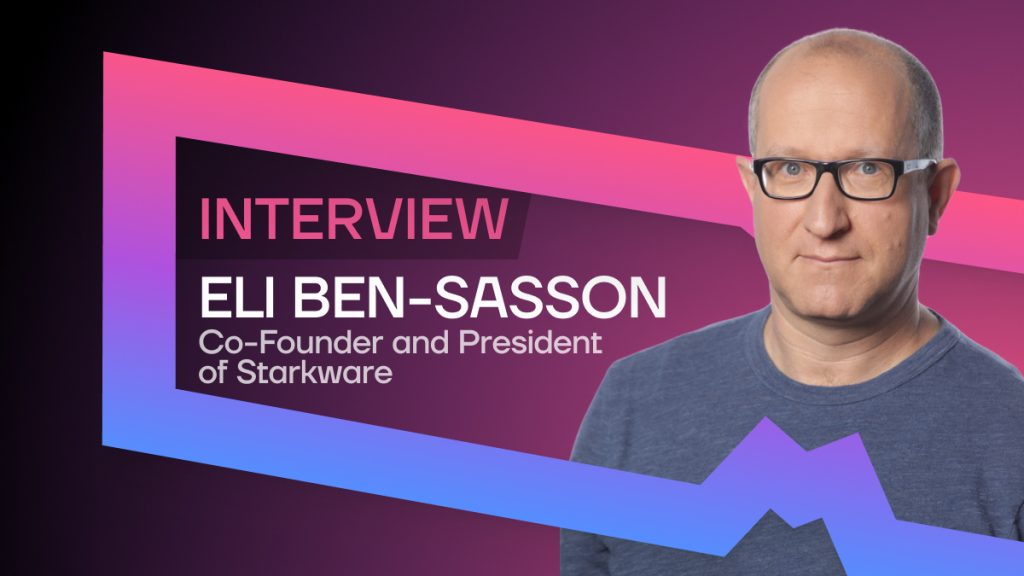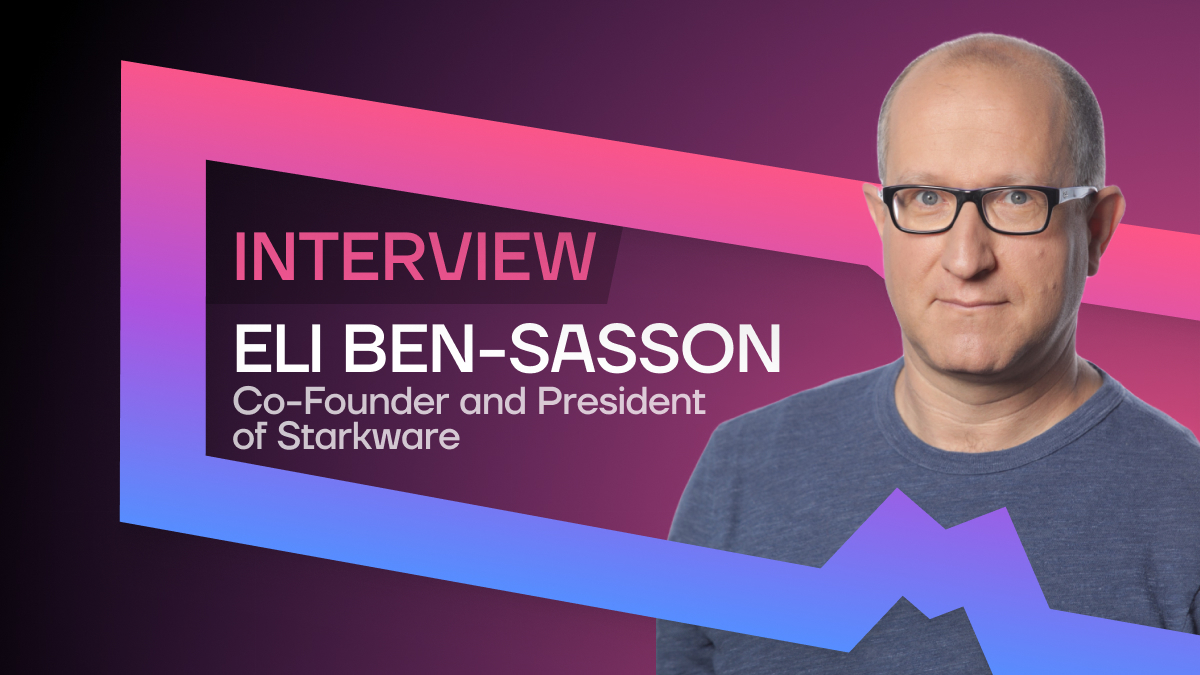
We’ve talked to Eli Ben-Sasson, the co-founder, president and chairman of the board at Starkware, at Starkware Sessions 2023, a two-day event that brings together the Ethereum community in Tel Aviv, Israel. During the interview, Ben-Sasson discussed web3 and cryptocurrency and what direction blockchains should take in the future to gain wider adoption.
Vadim: We’re going to start with a simple question. Please introduce yourself.
Eli: Okay, my name is Eli Ben-Sasson. I’m co-founder and president of Starkware. I arrived at Starkware because I was a theoretical computer scientist, and I was doing research that led to Starks.
What do you think about the current state of web3? What’s your project intake to the web3 and the cryptocurrency market?
So web3 right now is attempting to use blockchains, like Ethereum and Bitcoin, which are very reliable but also very clogged and slow as there’s a lot of demand for them. Starkware’s mission is to increase exponentially the scale of these blockchains through math and cryptography.
How do you see the modular future of blockchains and Starkware’s place in it?
Blockchains are going to evolve into a whole bunch of islands that are interconnected through something called fractal scaling, which was invented by Starkware. Fractal scaling allows you to have many duplicate semi-blockchains that are connected and have the same security as Ethereum through the power of Stark proofs.
Tell more about Starkware’s Prover.
The Starkware Prover, which we have just announced we are open-sourcing, is the engine that allows this scale and integrity to all come together. By open-sourcing it, we are basically saying this is a public good that must be in the hands of everyone and cannot be restricted to one company or entity. It’s going to be the engine that powers all this scale.
How big is it going to be? What are your expectations about this product this year and next year?
I think that developers are seeing that this is really the end game for scaling blockchains and is what can actually help reach global demand. Developers are coming along and helping propel it to something that will be used for everything like purchasing your cup of coffee every day, doing remittance payments across borders, reaching consensus on matters of social interest, and a whole bunch of other things. I believe this is the end game for scaling blockchains.
Yeah, that’s interesting. I can see how many developers at this conference believe in this technology. So my next question will be about decentralized and web3: the identity field is heating up. What do you think about this trend?
I think decentralized proofs of humanity and decentralized identity are extremely important topics. We started with the proof of work, which is really good security-wise, but it’s very problematic in terms of energy consumption. We’ve moved to the proof of stake, which is better in terms of energy consumption, but it’s not the end goal. The end goal should be proof of humanity and going back to one person, one vote. For that to happen, we need to have better proofs of identity and proofs of humanity, so I really hope this area evolves quickly over web3.
Do we need the device for that or just our wallet? So do you have any concept in your mind about this?
This is a very tough problem because if there’s an economic incentive, people can try and mimic humanity. This is essentially the Sybil attack. This is why I think the solution has to use social networks and graphs and rely on other people who are already established to be humans. However, I don’t have a solution in mind, and I think it’s an area of very important research to be done.
Do you think there is a use case for NFTs and metaverse on Starkware?
NFTs were a huge trend that has somewhat subsided because we’re inside crypto winter. I think NFTs are here to stay. Maybe the hype around them has rightfully gone down a little bit. StarkEx is already the greatest source of NFTs over Ethereum. Over 95 million NFTs are minted over our technology. I think NFTs are here to stay, but probably the kind of hype we saw a year ago doesn’t return, and they just are used for more standard things like tickets, playing games, you know, proofs of actual attendance in person, and things like that.
As we’re called Metaverse Post, tell us: What is the metaverse for you?
I think the metaverse is taking our social structures and social interactions and putting them back in a peer-to-peer way through the internet, not relying on a centralized company to mediate it. A true peer-to-peer social network that has integrity and security, as you’d expect of a blockchain.
So is it going to be the whole space where humanity can move to, or is it going to be one of the tools we’re going to use?
I think it’s going to be how we socially interact and where our social source of trust on the internet is. We have our own face-to-face interactions and our friends, but a lot of our life today is done on the internet. I think the place where we’re we will attach social and economic value to our presence on the Internet is going to transform into the metaverse, and it’s going to be decentralized. There’s not going to be a Facebook or an Instagram that is in control; it’s going to really be peer-to-peer like Bitcoin or Ethereum.
Read More: mpost.io









 Bitcoin
Bitcoin  Ethereum
Ethereum  Tether
Tether  XRP
XRP  Solana
Solana  USDC
USDC  Dogecoin
Dogecoin  TRON
TRON  Cardano
Cardano  Lido Staked Ether
Lido Staked Ether  Wrapped Bitcoin
Wrapped Bitcoin  Hyperliquid
Hyperliquid  Sui
Sui  Wrapped stETH
Wrapped stETH  Chainlink
Chainlink  Avalanche
Avalanche  LEO Token
LEO Token  Stellar
Stellar  Bitcoin Cash
Bitcoin Cash  Toncoin
Toncoin  Shiba Inu
Shiba Inu  Hedera
Hedera  USDS
USDS  Litecoin
Litecoin  WETH
WETH  Wrapped eETH
Wrapped eETH  Polkadot
Polkadot  Binance Bridged USDT (BNB Smart Chain)
Binance Bridged USDT (BNB Smart Chain)  Monero
Monero  Ethena USDe
Ethena USDe  Bitget Token
Bitget Token  Pepe
Pepe  Pi Network
Pi Network  Coinbase Wrapped BTC
Coinbase Wrapped BTC  WhiteBIT Coin
WhiteBIT Coin  Aave
Aave  Uniswap
Uniswap  Dai
Dai  Ethena Staked USDe
Ethena Staked USDe  Bittensor
Bittensor  OKB
OKB  Aptos
Aptos  NEAR Protocol
NEAR Protocol  Cronos
Cronos  BlackRock USD Institutional Digital Liquidity Fund
BlackRock USD Institutional Digital Liquidity Fund  Jito Staked SOL
Jito Staked SOL  Internet Computer
Internet Computer  Ondo
Ondo  Ethereum Classic
Ethereum Classic